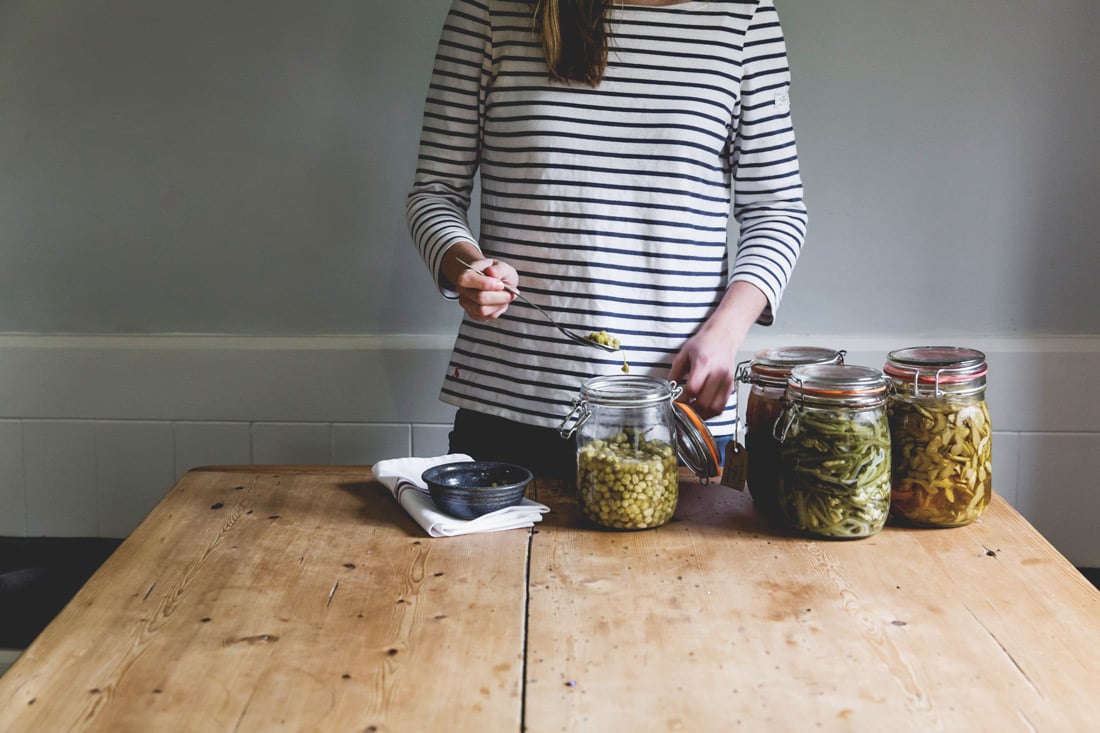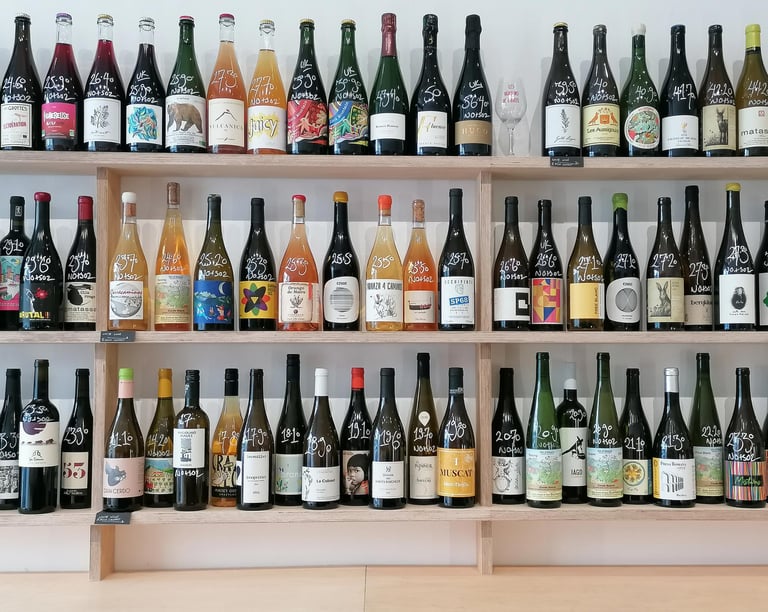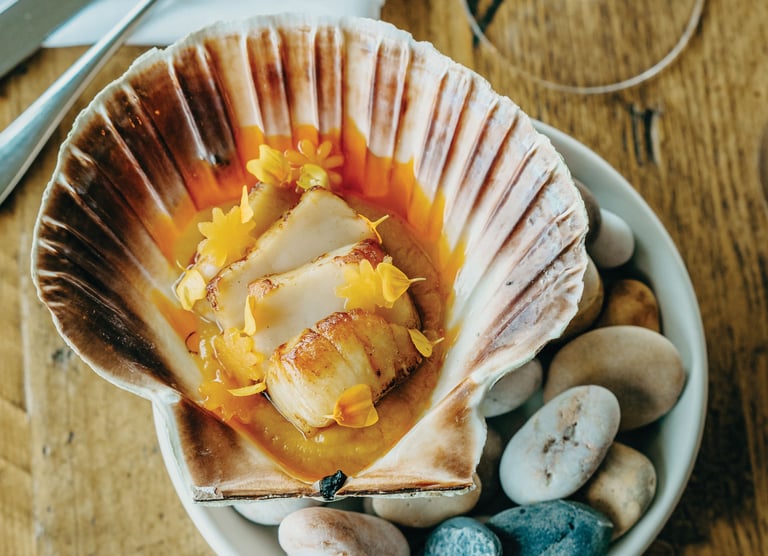Coombeshead Farm near Launceston is at the forefront of a restaurant trend connecting diners to a more sustainable way of life – and without a 1970s Laura Ashley smock in sight. Rosanna Rothery got a taste of the phenomenon
Cottagecore has taken over the internet with its aesthetic depicting rural life as a series of romantic vignettes to be experienced while sporting tiered skirts and a crocheted shawl. However, deep in the South West countryside, at destinations like Coombeshead Farm, a sibling movement has emerged with a similar vibe but which is rooted in food and dining.
Unlike the escapist daydream of cottagecore that fetishises country living, ruralcool is less about wafting through a potager in linen and more about donning wellies for a stomp through a working farm to meet the animals whose relations you’ll be eating for dinner.
Examples of the phenomenon include the newly Michelin‑starred Crocadon in St Mellion in Cornwall, a 120‑acre regenerative farm that lets guests feast on an unusual tasting menu amid the cosy informality of a converted cowshed. Another Cornish member of the tribe is Nancarrow Farm in St Allen, a restaurant on an organic farm. Just over the border in Devon is The Farmers Arms at Woolsery, a dining pub with suites and cottages which harvests ingredients from its regenerative farm.

However, the forerunner of the movement has been Coombeshead Farm near Launceston in Cornwall. When it opened in 2016, the restored dairy farm – a joint venture between chefs Tom Adams and April Bloomfield – was one of the first of a new generation of British chef‑run farm restaurants. Originally, the Coombeshead experience was about communal dining in its 18th‑century farmhouse, feeding guests produce from the farm. Then the dream got bigger and evolved to include a restaurant, a bakery (which now supplies sourdough to some of the best restaurants in the UK), an orchard, farmshop, self‑catered cottage and four cosy guestrooms in a converted grain store.
However, dinner and B&B on the 66‑acre estate doesn’t just involve feasting on exquisite homegrown produce in a rural environment; it also fulfils any secret rustic‑romantico fantasies you may be harbouring.

Fantasy made flesh
On arrival, a quick tour of the farmstead is enough to convince you you’ve arrived in a pastoral paradise: encounter snuffling Mangalitza and Middle White pigs, inhale the aroma of loaves bronzing in the bakery, feast your eyes on rolling meadows and lust after rows of homemade ferments, pickles and preserves.
Its rural vibe harks back to simpler times when people were more in tune with nature, and emphasis was put on traditional skills such as farming, foraging, baking and fermenting. The ‘cool’ bit hails from a young and enthusiastic team who relish putting a modern twist on the kind of recipes, skills and crafts with which their great grannies would have been familiar.
Contemporary artists’ handiwork, including beautiful pottery and bespoke prints, is also part of the appeal. Guests can even try their hand at some of these skills in workshops which include breadmaking, butchery, printmaking, drawing and painting.

A feast for the senses
Dinner at Coombeshead is served in a converted barn where sheepskin rugs, dark wood, earthenware pots and traditional farmhouse crockery are so tantalisingly tactile you’d be forgiven for running your fingertips over every surface.
The set menu (adapted for vegetarians and vegans) is an exquisite education for the palate. Each forkful bursts with flavours of the farm and vegetables and herbs, grown in the polytunnel, run the gamut of tastes from astringent and spicy to sweet and tart.
Meat is reared and butchered on‑site before being utilised in dishes such as Mangalitza cheek with artichoke cream, radicchio and bacon. The rare breed takes 18 months to mature so builds up flavour, each cut giving diners the unusual opportunity to experience pork as it used to be (a creamy red meat, not a white meat).
Puddings showcase joint skills of gardener and chef and include the likes of a gloriously tangy jostaberry sorbet with crème fraîche and grape granita.

Spirit of rustic loveliness
Each detail at Coombeshead turns an overnight stay in the farmhouse or one of the Grain Store rooms into the charming utopia of your daydreams. Thoughtful touches, such as dried flowers picked in the grounds and a welcome tipple of homemade earl‑grey gin, do a great job of getting visitors in the spirit of rustic loveliness. Add a sporadic phone signal (you might get a bar in the front field or near the circle of trees in the garden) and it’s a rare chance to disengage from the relentless dopamine trap of digital media in favour of simplicity, nature and cosiness.
Breakfast is a sensational event, and not to be skipped. Alongside homemade goodies (yogurt, Ashcombe cheese, muesli, granola, seasonal preserves, black bee honey, kombucha, apple juice and sourdough) are fresh‑from‑the‑kitchen surprises. Hot‑smoked beef sausage, streaky bacon, buttery brioche laden with jostaberry preserve, malt loaf, and kale and cheese galette would set up any ploughman for a day in the fields.
Follow the morning’s feast with a jaunt to experience the real romance of food reared and grown in a Cornish valley: Romney sheep, Red Devon cattle, black bees, guineafowl and broods of chickens scratching about in the woods. A walk to Lewannick for a pint in The Archer Arms or a short drive to The Springer Spaniel in Treburley for lunch takes this rustic reverie next level.
Don’t leave Coombeshead Farm without taking home a piece of the action. Sourdough and a malt loaf from the bakery, plus homemade pickles, preserves, candles and kombuchas from the farm shop are reminders of timeless simplicities.

Take a ruralcool roadtrip
Crocadon, St Mellion, Cornwall
Dishes are presented with theatre at this Michelin-starred restaurant, including a detailed explanation of how each ingredient made its journey from farm plot to plate. Dinner at Crocadon stimulates the brain as much as the palate, while unusual crops – Asturian tree cabbage, douglas fir, crosnes and strawberry myrtle – challenge notions of the range of edibles that can be grown on a Cornish farm.
Ex‑L’Enclume chef Dan Cox cooks with rare and heritage‑breed cattle and sheep and favours traditional skills such as fermenting, pickling and curing to use up gluts of produce.

Nancarrow Farm, St Allen, Cornwall
Visit this picturesque working farm to feast on its produce in a beautiful barn. It doesn’t operate as a normal restaurant; instead guests can book one of the regular farm suppers or even hold an event in the barn. A series of simple rustic buildings and wagons are also available for the night and come with a seriously good breakfast. Read our review of Nancarrow.

The Farmers Arms, Woolsery, Devon
The Farmers Arms is part of The Collective at Woolsery, a curation of authentic rural projects which includes the dining pub where head chef Ian Webber fashions modern British dishes from own‑grown‑and‑reared native plants and heritage breeds. The pub is flanked by a regenerative farm, quirky village store, gourmet fish and chip shop, plus guest rooms, suites and cottages. Enter our competition on page 93 to win dinner and a stay.
Enjoyed our deep dive into the ruralcool revolution? Check out our reviews of the region’s best restaurants.









